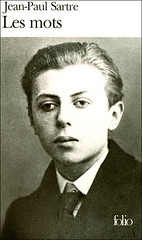Les Mots by Sartre
I bought and read Eco’s On Ugliness last Christmas, and a couple of days ago, a Sartre quote collected in that book resurfaced. The quote was taken from Sartre’s autobiography The Words and considers the smells of his childhood; the pleasant odors of women and the unpleasant but more serious odors of men. And then the bad breath of his schoolmaster which Sartre relished as the odor of learning and virtue.
I decided to investigate and Googling for Sartre and bad breath brings up The Great Unwashed[1], an article by Wendy Doniger O’Flaherty:
- “…Russell had such bad breath that Lady Ottoline Morrell refused to sleep with him for a while. Sartre was disgustingly dirty, and Connolly, left bathroom detritus in the bottom of his host’s grandfather clock ”
Etymologically attributed to Edmund Burke, the great unwashed is a phrase used to denote the populace, particularly the working class.
But here Doniger refers to the book Intellectuals by Paul Johnson which investigates the personal lives of philosophers and authors such as Rousseau, Shelley, Marx, Ibsen, Tolstoy, Hemingway, Brecht, Bertrand Russell, Sartre and Edmund Wilson, to name but a few.
Sartre, Connolly and Russell’s peculiarities remind me of toilet philosophy and embodied philosophies, but also calls into question the supposed gap between art and life (i.e. the space where Robert Rauschenberg liked to work) and the conflicting views of the New Critics and later the neoformalists who wish to excise all autobiographical details from philosophical arguments; vs the hermeneutic and Freudian approaches, which dare to augment the text with its paratext.
I am all for the latter interpretive methods (also because of the prevalence of the former in Anglo-American philosophy), a key factor in this conviction was Colin Wilson‘s reading of Wittgenstein‘s philosophy in The Outsider. Conventional sources will point you to the Heidegger / nazism debacle, but the Wittgenstein example is much more enlightening because Wilson links Wittgenstein’s homosexuality with his reluctance to speak the unspeakable and his eventual arrival at the maxim in the Tractatus:
- “What can be said at all can be said clearly; and what we cannot talk about we must pass over in silence.”
This phrase rendered Wittgenstein famous but is due to his repressed sexuality argues Wilson via Bartley.
- “Bartley‘s comment [on Wittgenstein’s homosexuality] help us to understand Wittgenstein’s attitude to philosophy. Wittgenstein possessed the disposition that is often found in saints and ascetics: a powerful craving for meaning and purpose, and immense self-disgust at his own failure to find them. […] It was this sense of failure, of living on the brink of an abyss, that produced in Wittgenstein the craving for certainty that led him to create the philosophical system of the Tractatus.” —Colin Wilson via The Misfits
and
- “[In the Tractatus], Wittgenstein was led to define truth as tautology – a mere repetition of the same meaning. […] Wittgenstein agrees that there is such a thing as religious truth and ethical truth. But he insists that it cannot be put into words, and that any philosopher who thinks he is talking about these great universal truths is merely deceiving himself. —Colin Wilson via The Misfits


I’ve heard about Russell’s bad breath before. apparently he had a lot of dental problems which were the cause of it.
another reason to look after your teeth…..
Wittgenstein’s aphorism is not a riddle. The trouble with good faith hermeneutic interpretations is that they reduce the richness of texts. Applied in bad faith, they dismiss the lasting value of original thought by “explaining” where it came from. Preserve us from both. The richest text is a message in a bottle.
Yes, I knew I was overstating my claim when I was writing it, but how else was i supposed to get you commenting here again. Shout out!
P. S. I was reminded of a Baudelaire quote when seeing your comment:
“What is the good of criticism? What is the good? — A vast and terrible question mark which seizes the critic by the throat from the very first step in the first chapter he sets down to write. …I sincerely believe that the best criticism is that which is both amusing and poetic: not a cold, mathematical criticism which, on the pretext of explaining everything, has neither love nor hate, and voluntarily strips itself of every shred of temperament… To be just, that is to say, to justify its existence, criticism should be partial, passionate and political, that is to say , written from an exclusive point of view, but a point of view that opens up the widest horizons.” –Charles Baudelaire writing on the occasion of the Salon of 1846, first published as a booklet, Paris 1846)
Why, I had no idea you were missing me. But now that we’ve both overstated our cases, I think we should agree to agree with Baudelaire.
And by the way, you could always comment on my site too, you know, when you want to get my attention. Shout out!
I believe that Wittgenstein’s philosophy was an attempt by him to reason a way to a bearable life. He was a tormented person, not least because of his sexual orientation. The connection between art, or in this case, philosophy and life is very clear.
W. never wrote anything, except his Tractatus, which he repudiated later. He was, I believe, a bit of a charlatan –
http://iamyouasheisme.wordpress.com/2008/01/18/ludwig-phoney/
although a very brilliant one. No fault of his own. The fact that his writing is considered the acme of a certain type of Anglophone philosophic discourse says something very sad about what philosophy has come to these days in the UK and USA. Unless things have changed since I was an undergrad…
Pingback: We cannot know the thing in itself, because the thing is … | Jahsonic